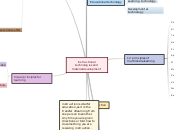instructional technologies and material development
Technology integration
1. Analysis of learning and teaching needs
1. Determine relative advantage
2. Assess tech-pack
2. Planning for integration
3. Decide on objectives, assessments
4. Design integration strategies
5. Prepare instructional environment
3. Post-instruction analysis and revisions
6. Analyze results
7. Make revisions
TPACK model
Technological knowledge
Pegogical knowledge
Content knowledge
Educational technology
Instructional technology
Learning technology
Developmental technology
12 principles of multimedia learning
Coherence principle
Signaling principles
Temporal contiguity principle
Segmenting principle
Pre-training principle
Spatial contiguity principal
Modality principle
Multimedia principle
Personalization principle
Voice principle
Image principle
Redundancy principle
Instruction
Diffusion of innovations
Innovation
The innovation-decision process
Knowledge stage
Persuasion stage
Decision stage
Implementation stage
Confirmation stage
Communicational channels
Time
Social system
Instructional Design
The Addie Model
Instructional Design Models
Dick & Carey
Smith & Ragan
Gagne, Briggs, Wagner
Reiser & Dick
Seels & Glasgow
Morrison, Ross, Kemp
Assure
Keller ARCS
Rapid prototyping
R2 D2
Merrienboer 4C
Characteristics of ID
learner-centered
goal-oriented
focuses on real-world performance
focuses on outcomes
empirical
team effort
Visual principles for learning
Visual literacy
Input strategy
Output strategy
Visual symbols
Realistic visuals
Analogic visuals
Organizational visuals
instruction is vital for education, as it is the transfer of learning from one person to another. Any time you are given directions or told how to do something you are receiving instruction.
Gagne's 9 events of instruction
Gain attention
Orient the learner
Stimulate recall of prior knowledge
Present content material
Provide learner guidance
Elicit performance practice
Provide informative feedback
Assess if lesson objectives have been learned
Enhance retention and transfer
